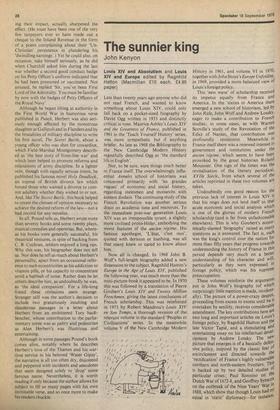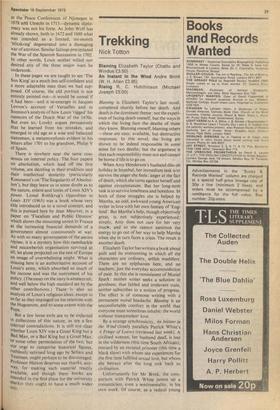The sunnier king
John Kenyon
Louis XIV and Absolutism and Louis XIV and Europe edited by Ragnhild Hatton (Macmillan £10 each, £4.95 paper)
Less than twenty years ago anyone who did not read French, and wanted to know something about Louis XIV, could only fall back on a pocket-sized biography by David Ogg written in 1933 and distinctly critical in tone. Maurice Ashley's Louis X1 V and the Greatness of France, published in 1961 in the 'Teach Yourself History' series, was more sympathetic but if anything briefer. As late as 1968 the Bibliography to the New Cambridge Modern History regretfully described Ogg as 'the standard life in English'.
Nor, to be sure, were things much better in France itself. The overwhelmingly influential Annales school of historians was concerned primarily with 'les grandes vagues' of economic and social history, regarding statesmen and monarchs with austere disdain. The continuing study of the French Revolution was another serious drain on academic time and resources. To the immediate post-war generation Louis XIV was an irresponsible tyrant, a slightly more civilised proto-Hitler, embodying the worst features of the ancien regime. His famous apothegm, 'L'etat, c'est moi', quoted with derision or loathing, was all that many knew or cared to know about him.
Now all is changed. In 1968 John B. Wolf's full-length biography added a new dimension to the subject. Ragnhild Hatton's Europe in the Age of Louis XIV, published the following year, was much more than the mini-picture-book it appeared to be. In 1970 this was followed by a translation of Pierre Goubert's Louis XIV and Twenty Million Frenchmen, giving the latest conclusions of French scholarship. This was reinforced in 1973 by Robert Mandrou's Louis XIV en Son Temps, a thorough revision of the relevant volume in the standard `Peuples et Civilisations' series. In the meanwhile volume V of the New Cambridge Modern History in 1961, and volume VI in 1970, together with John Stoye's Europe Unfolding, in 1969, provided a more balanced view of Louis's foreign policy. This 'new wave' of scholarship received its impetus equally from France and America. In the 'sixties in America there emerged a new school of historians, led bY John Rule, John Wolf and Andrew Lossky, eager to make a contribution to French studies; in some cases, as with Warren Scoville's study of the Revocation of the Edict of Nantes, that contribution was profoundly revisionist. Meanwhile in France itself there was a renewed interest in government and institutions under the ancien regime, which seems to have been provoked by the great historian Roland Mousnier. One sign of the times was the revitalisation of the literary periodical, XVIle Siècle, from which several of the articles reprinted in these two volumes are taken.
Undoubtedly one good reason for the previous lack of interest in Louis XIV IS that his reign does not lend itself to that acute economic and social analysis which is one of the glories of modern French scholarship (and is far from unfashionable elsewhere). This is why Goubert's economically-slanted 'biography' raised as many questions as it answered. The fact is, such was the king's control over the nation for more than fifty years that progress towards understanding the history of France in this period depends very much on a better understanding of his character and will, particularly as they were expressed in foreign policy, which was his suprerne preoccupation.
These volumes reinforce the arguments put in John Wolf's biography (of which surprisingly little mention is made, incident' ally). The picture of a power-crazy despot, proceeding from excess to excess until he is overtaken by senility, receives considerable amendment. The key contributions here are two long and important articles on Louis s foreign policy, by Ragnhild Hatton and the late Victor Tapie, and a stimulating and entertaining essay on his intellectual development by Andrew Lossky. The new picture that emerges is of a basically defer sive policy, inspired by the classic fear of encirclement and directed towards the 'rectification' of France's highly vulnerable northern and north-eastern frontiers. Th15,. is backed up by two detailed studies oil particular crises; Paul Sonnino on the Dutch War of 1672-8, and Geoffrey SymcON on the outbreak of the Nine Years' War in 1688, which show that though Louis had n° equal in 'static' diplomacy—for instance,
at the Peace Conferences of Njimegen in 1678 and Utrecht in 1713—dynamic diplo macy was not his forte. As John Wolf has already shown, both in 1672 and 1688 what was intended as a limited, six-month 'blitzkrieg' degenerated into a damaging war of attrition. Similar failings precipitated the War of the Spanish Succession in 1702.
In other words, Louis neither willed nor desired any of the three major wars he undertook.
In these pages we are taught to see 'The Sun King' as a much less self-confident and a more adaptable man than we had sup posed. Of course, the old portrait is not entirely painted out—it would be unreal if it had been—and it re-emerges in Jacques Levron's account of Versailles and in Sonnino's analysis of how Louis 'rigged' his memoirs of the Dutch War of the 1670s.
But even so, Lossky argues persuasively that he learned from his mistakes, and emerged in old age as a wise and balanced statesman, a metamorphosis evident in his letters after 1701 to his grandson, Philip V of Spain.
There is nowhere near the same consensus on internal policy. The four papers on absolutism, which lead off the first volume, are dazzling in their erudition and their intellectual dexterity (particularly Kossmann's on 'The Singularity of Absolutism'), but they leave us in some doubt as to the nature, extent and limits of Louis XI V's Power. Lionel Rothkrug's Opposition to Louis XIV (1965) was a book whose very title introduced us to a novel concept, and this is pursued here by Jean Meuvret, in a Paper on 'Fiscalism and Public Opinion' Which shows the mounting unrest in France at the increasing financial demands of a government almost continuously at war. As with so many governments of the widen regime, it is a mystery how this ramshackle and micawberish organisation survived at all, let alone projected on the rest of Europe an image of overwhelming might. What is missing here is an authoritative account of Louis's army, which absorbed so much of his income and was the instrument of his Policy. (The essay on the navy is amateurish, and well below the high standard set by the Other contributions.) There is also no analysis of Louis's religious ideas, except in SO far as they impinged on his relations with the Huguenots, and to some extent with the Pope.
But a few loose ends are to be extiected in collections of this nature, as are a few internal contradictions. It is still not clear Whether Louis XIV was a Great King but a Bad Man, or a Bad King but a Great Man, Or some other permutation of the two, but our urge to categorise historical figures, ruthlessly satirised long ago by Sellars and Yeatman, ought perhaps to be discouraged. Professor Hatton deserves our thanks, anyway, for making such material readily available, and though these books are Intended in the first place for the university Market they ought to have a much wider sale.






































 Previous page
Previous page